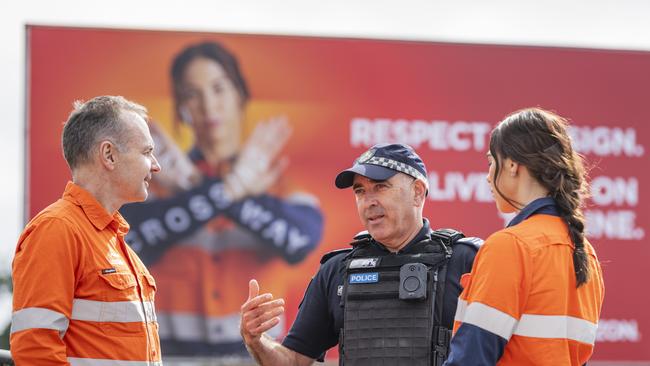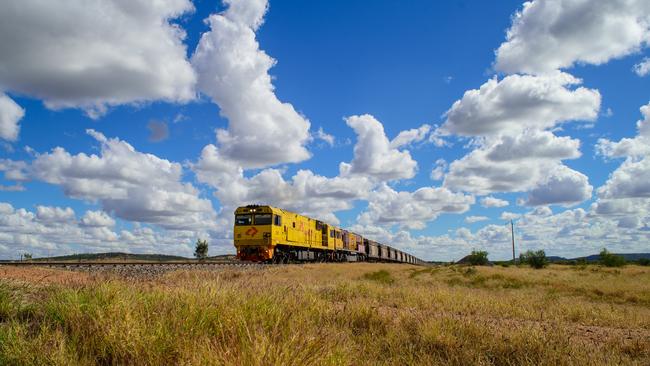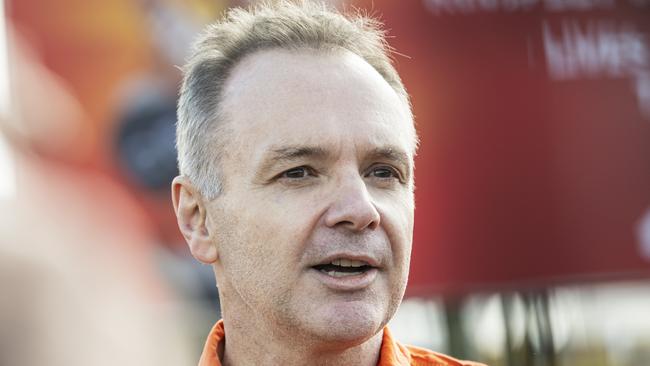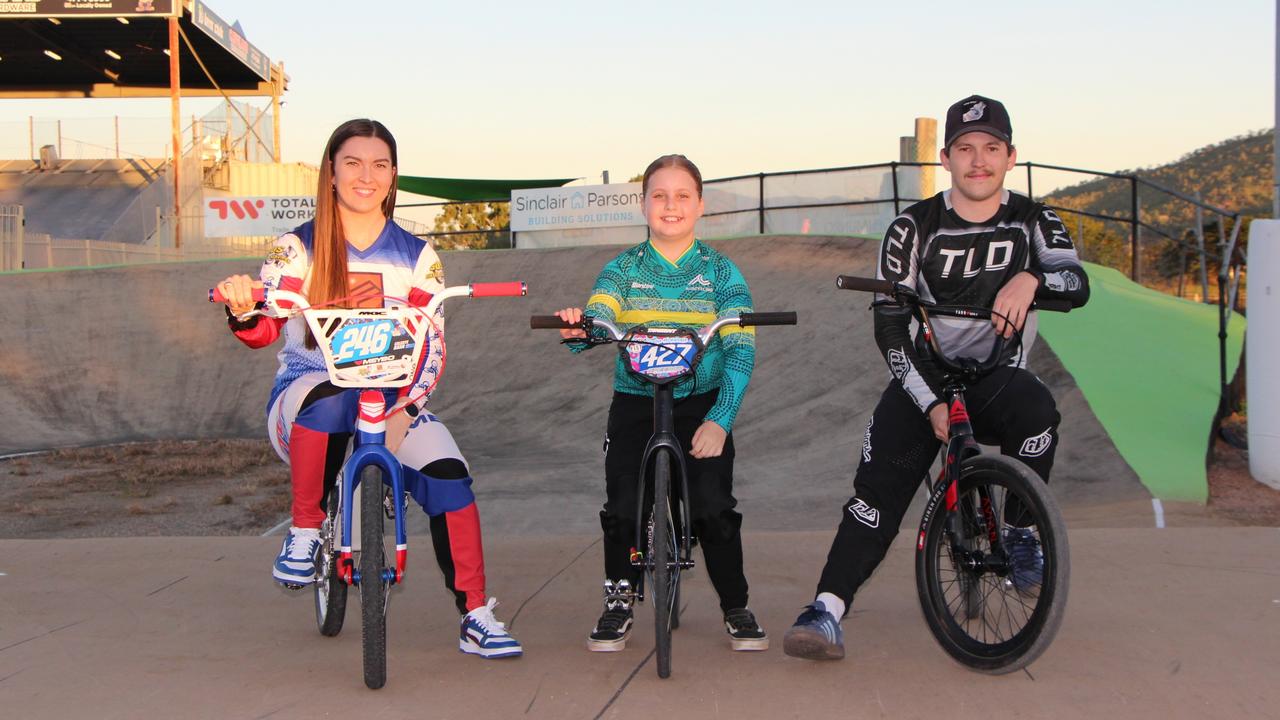Future Townsville: Aurizon CEO’s bold vision for transport in North Queensland
Train operator Aurizon has thrown its support behind putting more freight on railway tracks, saying it will not only make roads safer, but could cut emissions by 75 per cent.

News
Don't miss out on the headlines from News. Followed categories will be added to My News.
Putting more freight on railway tracks will not only make roads safer but could cut emissions by 75 per cent, an Australian operator says.
Aurizon CEO Andrew Harding’s call to action comes as the trucking industry experiences an ongoing worker shortage, soaring diesel prices, and more.
This year’s Future Townsville series, in partnership with S.Kidman, Bravus, Port of Townsville, Aurizon, Queensland Resources Council and Sun Metals, will examine the once-in-a-generation opportunities for trade and investment in this city.
Mr Harding said the main issue stopping rail from being Australia’s freight powerhouse wasn’t logistics, but that there was an unlevel playing field due to different pricing frameworks and lack of infrastructure investment.
“One of the major challenges is the different pricing frameworks that apply to heavy vehicles compared to rail freight operations, where trucks reap the benefit of a publicly funded road network,” Mr Harding said.
“Government policy should take into account the importance of decarbonising supply chains and rail freight’s ability to do the heavy lifting in terms of transport contributing to a target of net zero greenhouse gas emissions by 2050.”
Mr Harding said at the moment rail was clearly not reaching its potential.

“There is a compelling story of rail for this nation. And why investment decisions and policy setting must genuinely reflect the true value of rail,” he said.
“Australia as a decentralised, sparsely populated country demands much of its land transport system. There will always be rail, road, shipping, and air travel. What we need to do is to optimise them.”
Aurizon have over 700 locomotives and 15,000 wagons nationally and run five services a week from Brisbane to Cairns return and around four service per week on the Mt Isa line.
May, 2025: QLD government cut rail charges for young Phosphate mines
A seismic change has struck Mount Isa after the state government announced it’ll reduce rail charges for new phosphate mines.
Mining minister Dale Last made the annoucement at North West MPX Conference in Mount Isa on Wednesday, May 7.
According to Mr Last, Queensland Rail will introduce an incentive package to reduce access charges on the Mount Isa rail line, providing significant savings for emerging rock phosphate producers such as Centrex, whose Ardmore phosphate project entered voluntary administration in March due to excessive rail charges.

This measure is expected to increase freight volumes and support new entrants in the market.
“We want to see mines opening, not closing,” Mr Last said.
“That’s why we’re incentivising phosphate on the Mount Isa rail line, to take the pressure off new and existing rock phosphate rail users while they develop their operations.”
Mount Isa-based MP Robbie Katter has been hammering away at these issues for years.“Any action on the railway line is welcome, but so much more needs to be done,” Mr Katter said.
“At the end of the day the Mount Isa railway line remains one of the most expensive and prohibitive in Queensland, if not the developed world. We need to change how the QCA (Queensland Competition Authority) charges users.”
How many trucks are there?
Casting an eye over decades of Department of Transport data, we can see the number of trucks in Queensland sat at 67,000 in 2000 and proceeded to almost double to 115,305 trucks by 2024.
This corrolates with Queensland’s population growth: 3.6m in 2000 to 5.6m in 2024.
But it’s not like our roads have doubled in size since 2000 - the Bruce Hwy, our busiest and deadliest road, is still two lanes for most of its length.
Highway 50 per cent trucks
According to a 2019 Regional Transport Plan, traffic on the Flinders Hwy and Barkly Hwy can be up to 50 per cent trucks.
A snapshot of a section of the Bruce Hwy near Bowen in 2021 revealed 25 per cent of traffic travelling through the section were heavy vehicles - most of them B Doubles.
Who runs our freight trains?
Queensland’s 6,500km of train tracks are owned by Queensland Rail, a government body controlled by strict regulations from the Queensland Compeition Authority.
Queensland Rail, however, doesn’t operate any freight trains, instead focusing on passenger trains.
If you see a freight train pull cargo containers or wagons, you’re actually looking at an Aurizon or Pacific National train.
How many trains are there?
In 2017-18, the Mount Isa line saw over 70 train trips a week, which added up to approximately 84,000 tonnes of freight a year.
That data comes from the 2020 North Queensland Regional Transport Plan, which described rail as “critical” for the Mount Isa - Townsville economic zone’s future.
Essentially, if we want to make any money out of all that dirt behind Hughenden, we need trains.
This year’s Future Townsville series, in partnership with S.Kidman, Bravus, Port of Townsville, Aurizon, Queensland Resources Council and Sun Metals, will examine the once-in-a-generation opportunities for trade and investment in this city.
Originally published as Future Townsville: Aurizon CEO’s bold vision for transport in North Queensland



